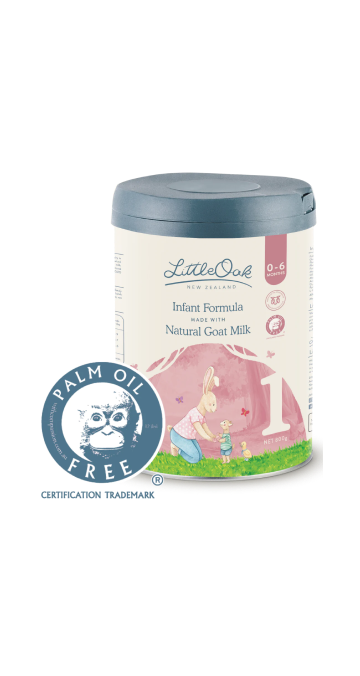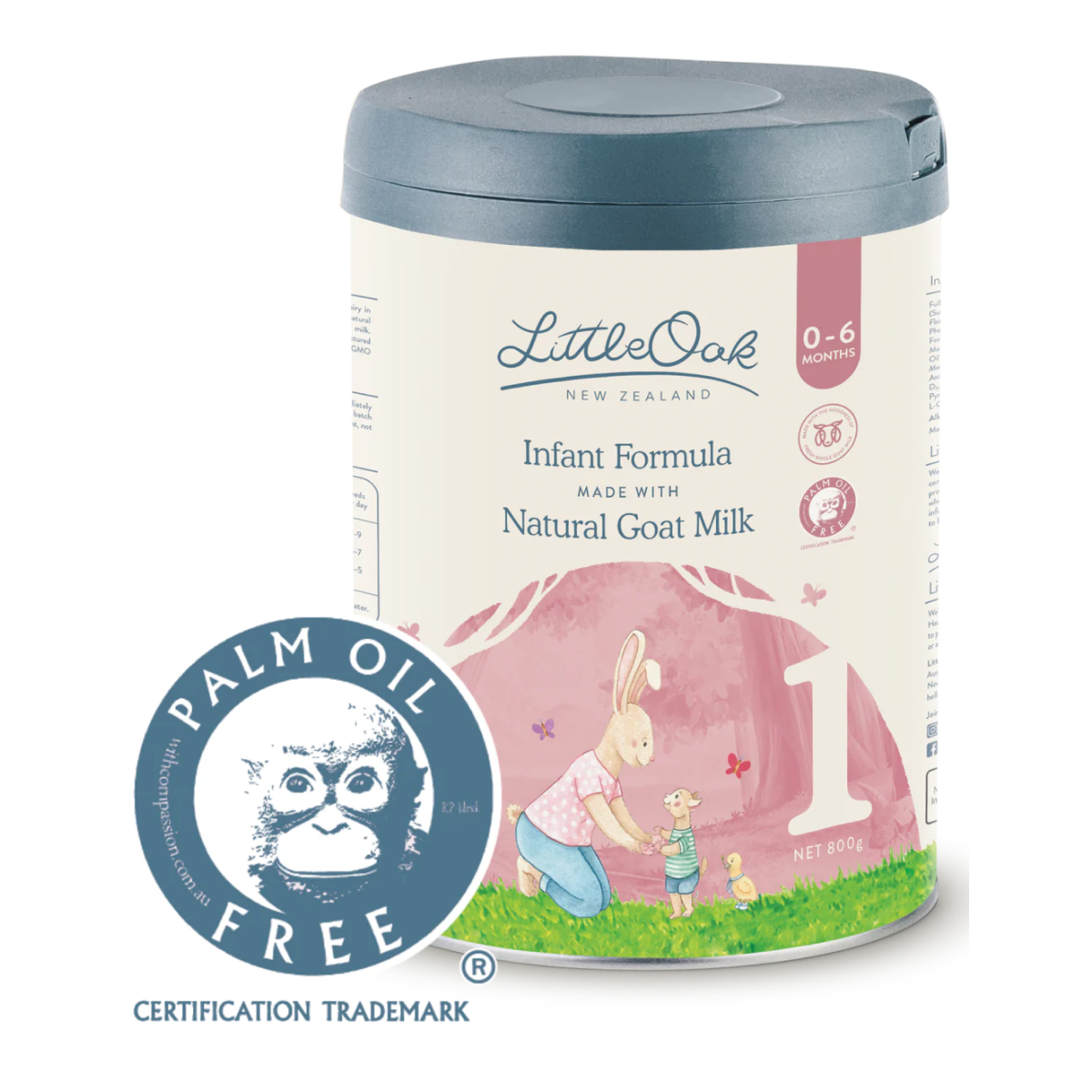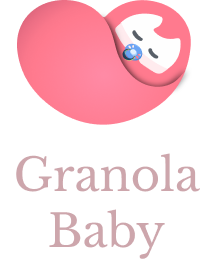
How Long is Baby Formula Good For?
Becoming a new parent is like diving into a whole new world, especially when it comes to feeding time. But don’t worry! We’ve teamed up with pediatric nutrition experts to bring you the best tips on how to store, prepare, and serve baby formula safely and efficiently. Let's make this journey a bit smoother and a lot more fun!

LittleOak
- Complete nutrition modeled after breastmilk
- Naturally occurring A2 proteins
- Sourced from grass-fed New Zealand goats
- World's first no palm oil formula
Powdered Infant Formula
If you’re opting for formula to nourish your tiny human, powdered baby formula comes with two big perks: It’s easy on the wallet and kinder to the planet due to its minimal packaging.
But here’s the scoop: Powdered formula can sometimes harbor a bacteria called cronobacter. This is super rare, but it can be particularly dangerous for very young, premature, or immune-compromised munchkins. Fear not! Safe preparation and storage can help keep cronobacter and other nasties like salmonella at bay, as advised by our trusty friends at the Centers for Disease Control (CDC). So, if your little one falls into those sensitive categories, just take a few extra steps when mixing their formula.
How Long Is a Prepared Bottle Safe at Room Temperature?
Once you’ve mixed up that bottle of powdered formula, it’s good to go for up to two hours at room temperature. But once your little one starts sipping, you’ll want to finish it within the hour, according to Corey Fish, M.D., lead pediatrician and chief medical officer at Brave Care in Portland, Oregon.
Dr. Fish warns, “Nasty bacteria can start partying in the bottle if it’s left out after a partial feed, potentially giving your baby a foodborne illness. And given their young age and not-yet-robust immune system, this could be seriously dangerous.” So, better safe than sorry—keep an eye on those feeding times!
How Long Is a Prepared Bottle Good for if Refrigerated?
When it comes to keeping your little one’s formula fresh, the gold standard is to whip up a bottle just before mealtime. However, real life happens! If you need to prep in advance, you can safely store a pre-mixed and unused bottle in the refrigerator for up to 24 hours. This way, you can ensure your baby’s bottle stays free from any unwelcome bacterial guests. So go ahead, prep with confidence!
How Long Does Powdered Baby Formula Last Once Opened?
Wondering how long that can of powdered baby formula is good for once you’ve popped it open? Typically, you’ve got about one month to use it all up. But hey, every brand might have its own quirks, so don't forget to check the product label for the nitty-gritty details. And, of course, always mind the expiration date on the can—safety first, after all!
Concentrated and Ready-to-Feed Baby Formula
While often pricier than powdered formula options, concentrated and ready-to-feed liquid baby formulas bring a whole new level of convenience and ease for busy modern parents. Concentrated formulas do need a bit of mixing with water, but the ready-made versions? Absolutely zero prep work required! Just pour and serve. Plus, here’s a sweet bonus: Liquid formulas are sterile, making them the safest choice for your tiniest and most delicate little ones.

Our #1 pick for the most nutritious infant formula
LittleOak products are designed to meet the dietary needs of growing little ones. It is made with fresh whole goat milk straight from dairy in New Zealand.
How Long Does an Opened Baby Bottle Last?
Once opened, a container of concentrated or ready-to-feed formula should be used pronto or covered and popped into the fridge where it can chill for up to 48 hours. Just like powdered formula, an unopened bottle can hang out at room temperature for two hours. However, once Baby has had a sip, the clock starts ticking – you’ve got one hour to use it or lose it.
Can I Save Leftover Formula in a Bottle After a Feeding?
No matter which formula you go with, the golden rule for feeding stays the same: Any leftover formula? Straight to the drain it goes. Trust us, Marina Chaparro, a registered dietitian and the mastermind behind Nutrichicos—a family-based nutrition practice in sunny Miami—insists on it.
"It can be tempting to reuse the remaining formula in your baby’s bottle, but doing so can put your baby at risk for bacterial contamination," she says. The reason? Bacteria from your baby’s saliva can mix with the formula and have a little party, multiplying like crazy.
Can I Save Unused Heated Formula?
Once you’ve warmed up that formula, remember: it’s a one-hour deal! Any leftover should be consumed within sixty minutes or tossed away. “Under no circumstances should you reheat formula,” advises Lisa Richardson, a top-notch pediatric dietitian in Carrboro, North Carolina. “Reheating boosts bacterial growth and breaks down those essential nutrients.”
Expert Tips for Mastering Baby Formula
Like all things baby-related, prepping, storing, and serving formula comes with its own set of guidelines. Keep these tips in mind to ensure your baby's formula-feeding experience is safe and sound.
Read the Label
For the latest and greatest in formula prep, make sure to check out the label on your specific formula product. You'll find detailed instructions on storage, preparation, and dilution, along with advice for safe handling. If you’re using powdered formula for a newborn, a preemie, or a baby with a weakened immune system, make sure to follow the CDC’s preparation guidelines.
Keep All Containers in a Cool, Dry Spot
Store unopened baby formula in a cool, dry spot with the lid tightly closed. According to the CDC, you should avoid keeping unopened formula in:
- Your car
- The garage
- Outdoors
Practice Safe Handling
When preparing baby formula, be sure to follow these safety guidelines:
- First things first, wash those hands and give your workspace a clean sweep before diving into bottle prep.
- Clean bottles thoroughly with hot, soapy water, then sterilize them by boiling for at least 5 minutes (or as directed on the package). You can also use a microwave or electric steamer for convenience. And remember, let those bottles cool off before putting them to use.
- Avoid using the microwave to warm formula. It can heat unevenly and lead to hot spots that could burn your little one. Safety first!
Plan Your Formula Prep Based on Your Baby's Feeding Schedule
Convenience is key, but safety is crucial. Mixing up bottles for the whole day? Dr. Fish says, "Let's not risk the bacterial blues." Instead, let’s find a happy medium that works for everyone.
Here’s a tip from Chaparro: Pre-measure the formula powder and water, but don’t go full shake-and-bake until it’s time to serve. If your little one is on a three to four-hour feeding cycle, you'll be looking at prepping six to eight bottles a day. Easy peasy!
When You're Unsure, Just Let It Go
When it comes to formula feeding, Dr. Fish has a golden rule for all parents: When in doubt, toss it out. “Saving a few bucks isn’t worth the risk,” he advises. “Dump the dubious batch and whip up a fresh one with a newly sanitized bottle.”
